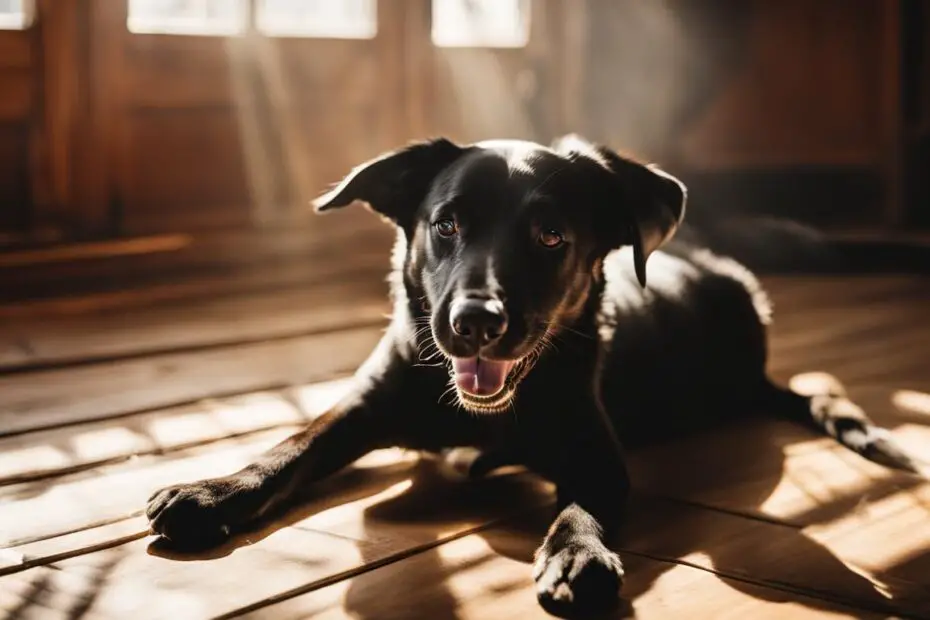Is your dog suddenly exhibiting excessive floor licking behavior? If so, it’s important to understand the reasons behind this unusual behavior and how to address it effectively. Excessive dog licking may indicate an underlying issue that needs attention. Let’s explore the common causes of excessive licking and discover ways to help your furry friend.
Key Takeaways:
- Excessive floor licking in dogs can be a sign of boredom, anxiety, nutritional deficiencies, illness, or habit.
- It’s important to rule out any underlying health issues that may be causing the excessive licking.
- Addressing the underlying cause, such as providing mental and physical stimulation, a balanced diet, or behavior modification techniques, can help reduce excessive licking.
- Managing the dog’s environment and providing alternative safe licking options can also be effective in preventing floor licking behavior.
- Training and obedience, including teaching basic commands and using positive reinforcement, can redirect and shape desired behaviors.
Common Causes of Excessive Dog Licking Behavior
Dogs may exhibit sudden and excessive floor licking due to various reasons. Understanding these causes can help pet owners address the behavior appropriately. The most common reasons for dogs licking the floor excessively are as follows:
- Boredom: Lack of mental and physical stimulation can lead to a sudden increase in dog floor licking. Dogs may resort to licking the floor as a way to seek stimulation and alleviate their boredom.
- Anxiety: Dogs experiencing anxiety or stress may engage in excessive licking as a self-soothing behavior. Floor licking provides temporary comfort and distraction from their anxious thoughts.
- Nutritional Deficiencies: Dogs may lick the floor excessively if they are lacking certain nutrients in their diet. This behavior can be a way for them to search for missing nutrients by exploring different surfaces.
- Illness: Dogs in pain or discomfort may exhibit sudden and excessive floor licking as a response to their physical condition. It’s important to consider any underlying health issues that could be causing the behavior.
- Habit: In some cases, floor licking can become a habitual behavior. Dogs may develop a routine of licking the floor, especially if they have been rewarded for the behavior in the past.
Identifying the root cause of excessive dog licking is essential in order to address the behavior effectively. By understanding these common causes, pet owners can take appropriate measures to help their dogs overcome this habit.
Below is a table summarizing the common causes of excessive dog licking behavior:
| Cause | Description |
|---|---|
| Boredom | Lack of mental and physical stimulation |
| Anxiety | Stress and anxiety leading to self-soothing behavior |
| Nutritional Deficiencies | Likely searching for missing nutrients |
| Illness | Pain or discomfort triggering excessive licking |
| Habit | Developed routine or learned behavior |
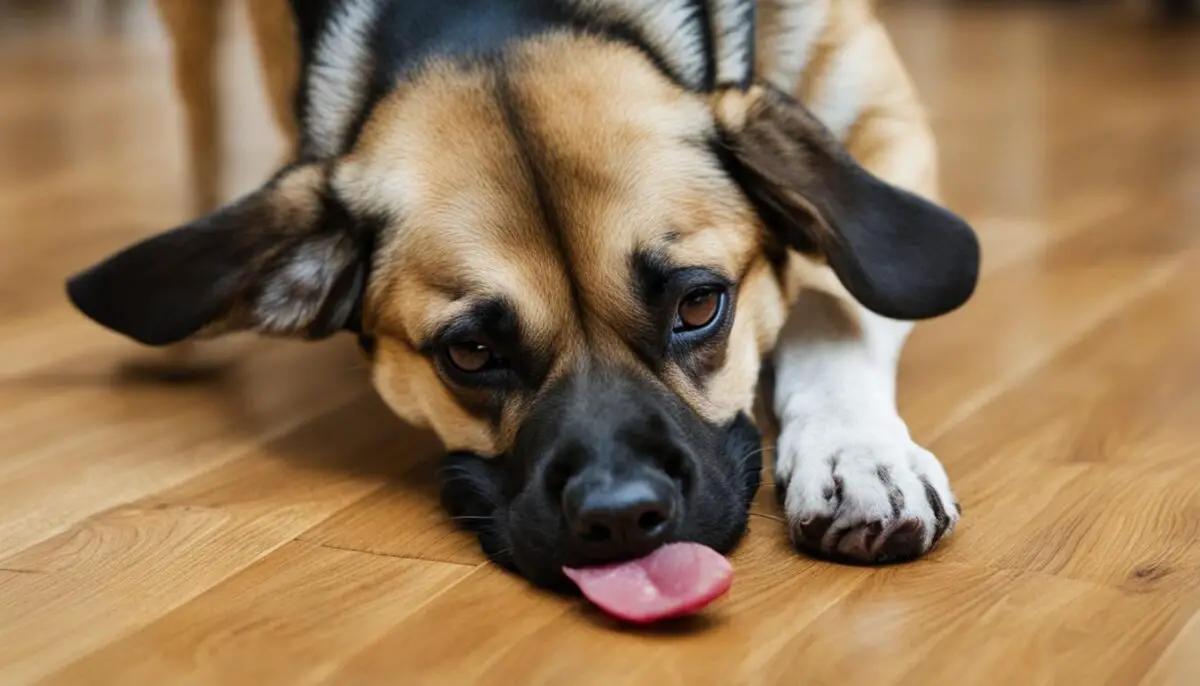
Understanding the underlying causes of excessive dog licking behavior is the first step towards effectively addressing the issue. In the following sections, we will delve deeper into the significance of health issues and behavioral factors in excessive floor licking, as well as explore strategies for addressing and preventing this behavior.
Significance of Health Issues in Excessive Floor Licking
Excessive floor licking in dogs can be more than just a quirky behavior. It can actually be a sign of underlying health issues that require attention. Studies have shown a correlation between excessive licking and gastrointestinal problems such as giardiasis, pancreatitis, or delayed gastric emptying.
Dogs with these conditions may exhibit obsessive licking behavior as a way to alleviate discomfort or seek relief. It’s essential to address the underlying health issues to help reduce the floor licking habit and improve your dog’s overall well-being.
If you notice that your dog’s excessive licking is accompanied by other symptoms like vomiting or diarrhea, it’s crucial to consult with a veterinarian. They can perform a thorough examination to rule out any medical conditions and provide appropriate treatments if necessary.
To better understand the significance of health issues in excessive floor licking, let’s take a look at some common gastrointestinal problems that can contribute to this behavior:
| Gastrointestinal Issue | Description |
|---|---|
| Giardiasis | A parasitic infection caused by Giardia organisms that affect the gastrointestinal tract, leading to symptoms such as diarrhea, vomiting, and excessive licking. |
| Pancreatitis | Inflammation of the pancreas that can cause abdominal pain, digestive problems, and a range of symptoms including excessive licking. |
| Delayed Gastric Emptying | Also known as gastroparesis, this condition involves the partial paralysis or delayed movement of food from the stomach into the small intestine. Dogs with delayed gastric emptying may experience discomfort and resort to excessive licking. |
By addressing these gastrointestinal issues through appropriate veterinary care and treatments, you can help alleviate your dog’s excessive floor licking habit and improve their overall quality of life.
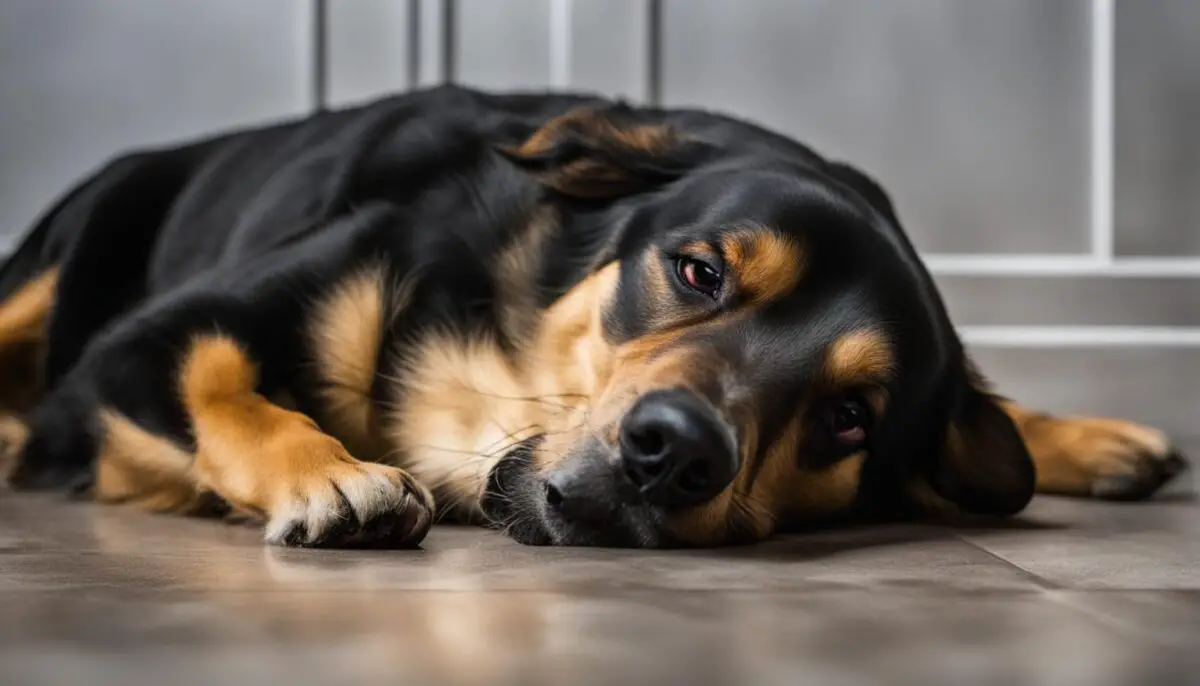
Seeking Veterinary Advice for Excessive Licking
If you suspect that your dog’s floor licking is more than just a quirky behavior, it’s important to consult with a veterinarian. They can thoroughly evaluate your dog’s health, conduct necessary tests, and provide accurate diagnoses. A veterinarian will guide you through the treatment process and help you implement effective strategies to manage and minimize your dog’s excessive licking habit.
Behavioral Reasons for Excessive Dog Licking
Excessive dog licking can often be attributed to behavioral factors. Dogs may resort to floor licking as a displacement behavior, particularly when they are feeling stressed or conflicted. It serves as a coping mechanism for them during challenging situations. Separation anxiety can also trigger excessive floor licking as dogs attempt to alleviate their anxiety when left alone.
If the licking behavior persists over time, it can become a repetitive habit. Dogs may develop a compulsion for floor licking, engaging in the behavior without any specific trigger. This compulsive floor licking in dogs can be challenging to address but understanding the underlying reasons is crucial in finding effective solutions.
By identifying the behavioral reasons behind excessive dog licking, pet owners and trainers can implement appropriate training and management strategies. Behavioral modification techniques, such as redirection and providing alternative forms of stimulation, can help redirect dogs’ compulsive floor licking behavior.
It is important to remember that each dog is unique, and the approach to treating behavioral issues may vary. Consulting with a professional dog trainer or a veterinary behaviorist can provide valuable guidance in addressing compulsive floor licking and promoting overall well-being.
| Behavioral Reasons for Excessive Dog Licking | Symptoms |
|---|---|
| Displacement behavior |
|
| Separation anxiety |
|
| Compulsive behavior |
|
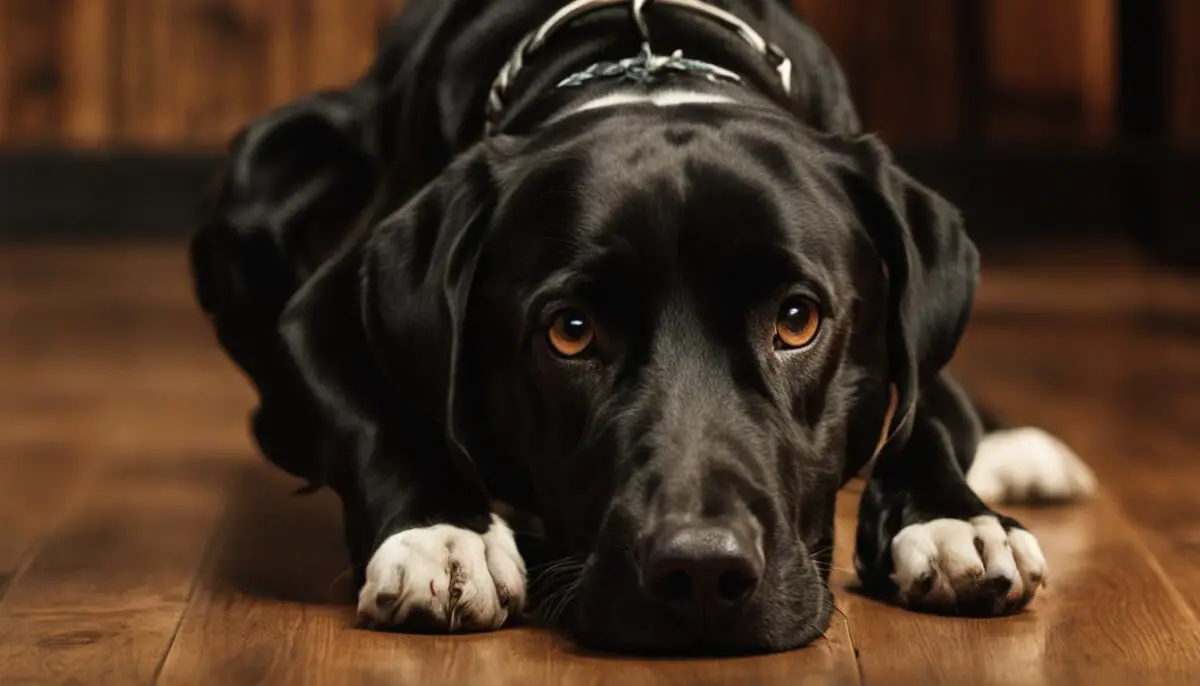
Addressing Excessive Dog Licking
To address excessive dog licking, it is crucial to identify and address the underlying cause. Understanding the possible causes of excessive licking behavior can help in implementing effective strategies to prevent it.
1. Boredom:
If your dog is licking the floor excessively due to boredom, providing mental and physical stimulation is essential. Interactive toys, regular exercise, and obedience training can divert their focus from licking the floor to engaging in more appropriate activities.
2. Nutritional Deficiencies:
A balanced and nutritious diet plays a significant role in preventing nutritional deficiencies that may trigger floor licking. Consult with your veterinarian to ensure that your dog’s diet meets all their nutritional needs.
3. Separation Anxiety:
Dogs with separation anxiety may resort to licking the floor as a coping mechanism. Behavioral modification techniques, such as desensitization and counterconditioning, can help alleviate separation anxiety and reduce excessive licking behavior. Seek guidance from a professional dog trainer or behaviorist for effective strategies.
4. Underlying Health Issues:
It’s important to rule out any underlying health issues that may be causing your dog to lick the floor excessively. Schedule a veterinary examination to address any potential medical conditions and follow the recommended treatment plan.
| Possible Causes | Recommended Solutions |
|---|---|
| Boredom | Provide mental and physical stimulation through interactive toys, exercise, and training. |
| Nutritional Deficiencies | Ensure a balanced and nutritious diet; consult a veterinarian if necessary. |
| Separation Anxiety | Use desensitization and counterconditioning techniques; seek help from a professional trainer or behaviorist. |
| Underlying Health Issues | Schedule a veterinary examination and follow the recommended treatment plan. |
By addressing the underlying causes and providing appropriate interventions, you can help your dog overcome excessive floor licking and improve their overall well-being.
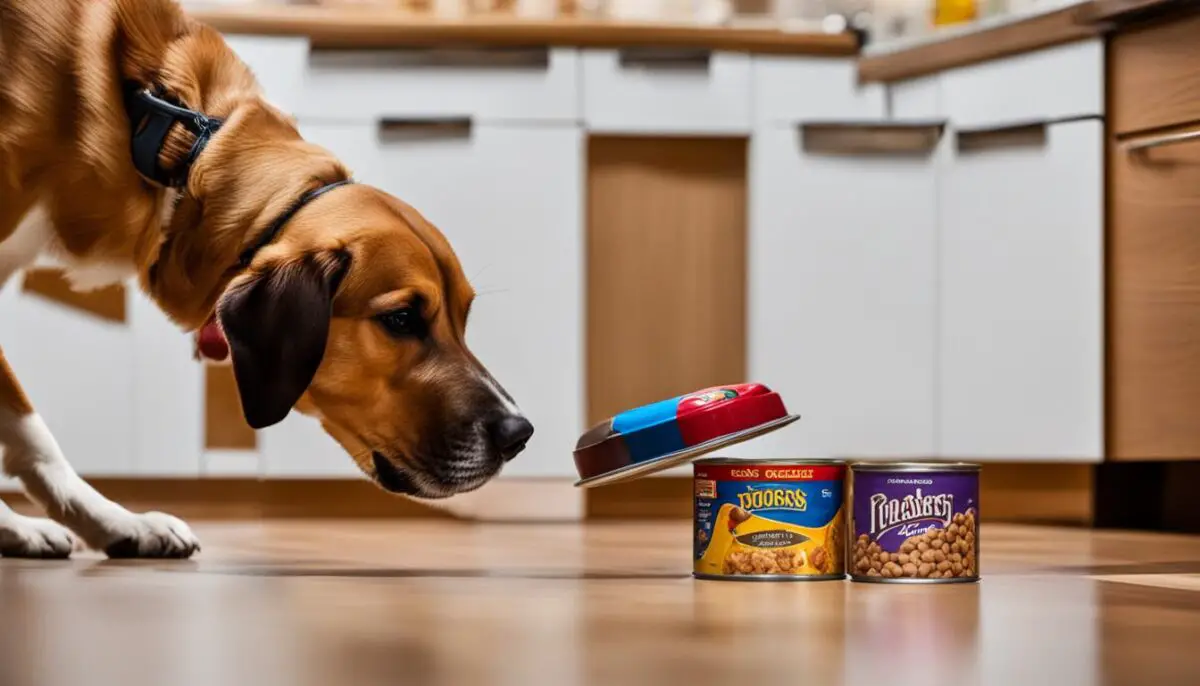
Environmental Management to Prevent Floor Licking
When it comes to preventing floor licking in dogs, managing their environment is key. By taking a few simple steps, you can discourage this behavior and provide your furry friend with alternative options.
Preventing Access to Lick Areas
If your dog has a specific area or object they frequently lick, preventing their access to it can help break the habit. Use baby gates or other barriers to restrict their access, creating a physical boundary that prevents them from reaching the floor or the object of their interest.
Redirecting Licking Behavior
Offering alternative safe licking options can redirect your dog’s behavior away from the floor. Lickimats or dog-safe spreads are excellent choices. These products provide a textured surface or a tasty distraction that satisfies your dog’s need to lick.
Stimulating and Enriching Environment
Boredom can contribute to excessive floor licking, so it’s important to provide your dog with mental stimulation and an enriching environment. Incorporate puzzle toys and training games into their routine to keep their minds engaged and prevent them from turning to floor licking out of sheer boredom.
Additionally, regular exercise and daily walks can help expel excess energy and reduce the likelihood of your dog resorting to licking the floor for stimulation.
| Environmental Management Strategies | Benefits |
|---|---|
| Preventing access to lick areas | – Breaks the habit – Reduces reinforcement of excessive licking |
| Redirecting with Lickimats or dog-safe spreads | – Provides alternative safe licking options – Helps satisfy the licking urge |
| Stimulating and enriching environment | – Combats boredom – Keeps the dog mentally engaged and stimulated |
By implementing effective environmental management techniques, you can create a conducive environment that discourages floor licking and promotes your dog’s overall well-being. Combine these strategies with other approaches, such as addressing underlying health issues and providing appropriate training, to effectively manage and reduce excessive floor licking in your beloved pet.
Training and Obedience for Excessive Dog Licking
To address your dog’s excessive licking behavior, teaching them basic obedience commands can be highly effective. One essential command to focus on is “leave it.” This command allows you to redirect your dog’s attention away from floor licking and onto something more suitable.
Positive reinforcement techniques, such as clicker training, can be employed to shape your dog’s behavior. When your dog licks the floor, use the “leave it” command and reward them when they comply. This positive reinforcement helps establish alternative behaviors to floor licking.
Implementing reward-based training methods not only helps address excessive licking but also makes living with your dog more enjoyable. By providing plenty of mental and physical enrichment through training, you can ensure that your dog is engaged and stimulated. Not only will this discourage floor licking, but it will also foster a stronger bond between you and your furry friend.
While training your dog, it’s essential to be patient and consistent. Remember that each dog learns at their own pace, and it may take time for them to fully grasp and obey the “leave it” command. If you encounter difficulties or need additional guidance, consider working with a professional dog trainer or behaviorist who can provide expert advice and support specific to your dog’s needs.
Conclusion
Excessive dog licking of the floor can be a concerning behavior that may indicate underlying issues. It is important to understand the potential causes behind this behavior in order to effectively address and manage it.
By identifying and treating any underlying health problems, such as gastrointestinal issues or pain, you can help reduce the floor licking habit. Providing dogs with mental stimulation through interactive toys, exercise, and training can redirect their focus away from the floor.
Incorporating behavior modification techniques, like desensitization and counterconditioning, can be beneficial, especially for dogs with separation anxiety. Additionally, teaching basic obedience commands, such as “leave it,” can provide an alternative response when dogs engage in floor licking. Positive reinforcement techniques, like clicker training, can be used to reward desired behaviors and discourage excessive licking.
If you are unable to resolve the excessive floor licking issue on your own, it is recommended to consult with a veterinarian or a professional dog trainer for further guidance and assistance. With the right approach and necessary support, it is possible to minimize or eliminate the problem, ensuring a healthier and happier environment for both you and your furry friend.
FAQ
Why is my dog suddenly licking the floor excessively?
Excessive floor licking in dogs can be caused by various factors, including boredom, anxiety, nutritional deficiencies, illness, or habit. It is important to determine the underlying cause to address the behavior effectively.
What are the common causes of excessive dog licking behavior?
The sudden increase in dog floor licking can be attributed to reasons such as boredom, anxiety, stress, nutritional deficiencies, or the development of a habit over time.
How significant are health issues in excessive floor licking?
Excessive licking in dogs can indicate potential health problems, such as gastrointestinal issues like giardiasis, pancreatitis, or delayed gastric emptying. Identifying and addressing these health issues can help reduce the floor licking habit.
What are the behavioral reasons for excessive dog licking?
Compulsive floor licking in dogs can be a result of behavioral factors, including displacement behavior, stress, or separation anxiety. Understanding these behavioral reasons can assist in implementing appropriate training and management strategies.
How can I address my dog’s excessive licking?
To address excessive dog floor licking, it is crucial to identify and address the underlying cause. This may involve providing mental and physical stimulation, ensuring a balanced diet, implementing behavioral modification techniques, and consulting with a veterinarian for proper treatment.
How can I prevent my dog from licking the floor?
Managing the dog’s environment plays an important role in preventing floor licking. This can be achieved by restricting access to specific areas or objects that the dog frequently licks and providing alternative safe licking options. Creating a stimulating and enriching environment through mental stimulation activities can also help reduce floor licking behavior.
How can I train my dog to stop licking the floor excessively?
Teaching basic obedience commands, such as “leave it,” can be useful in redirecting dogs when they engage in floor licking. Positive reinforcement training techniques, like clicker training, can help shape desired behaviors and provide alternatives to licking. Working with a professional dog trainer or behaviorist can offer guidance and support in training dogs to overcome excessive licking habits.
Conclusion
Excessive dog licking of the floor can indicate underlying issues. By understanding the potential causes and implementing appropriate measures, such as addressing health problems, providing mental stimulation, and training, it is possible to reduce or eliminate excessive floor licking behavior.
Source Links
- https://www.arkansasonline.com/news/2021/sep/13/excessive-licking-in-dogs-often-a-stomach-problem/
- https://zigzag.dog/en-us/blog/puppy-behavior/understanding-your-puppy/help-why-is-my-dog-constantly-licking-the-floor/
- https://dharamsalaanimalrescue.org/strange-dog-behavior-why-is-my-dog-licking-the-floor/
